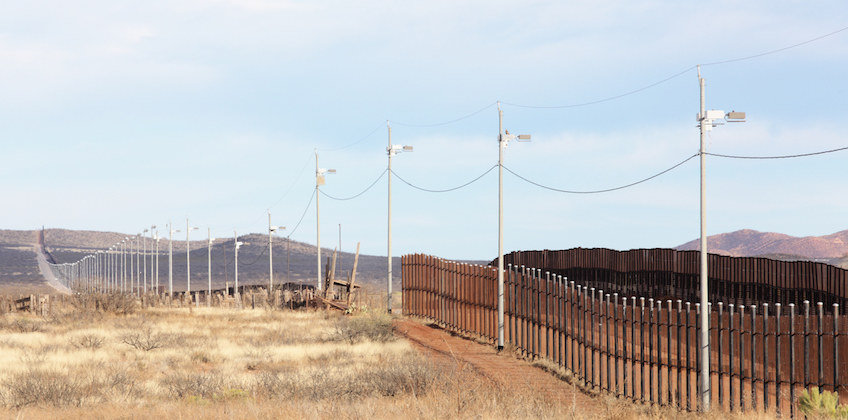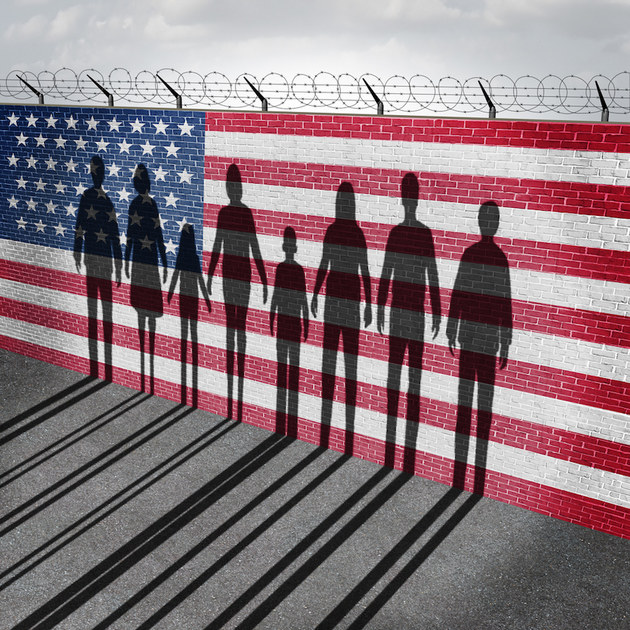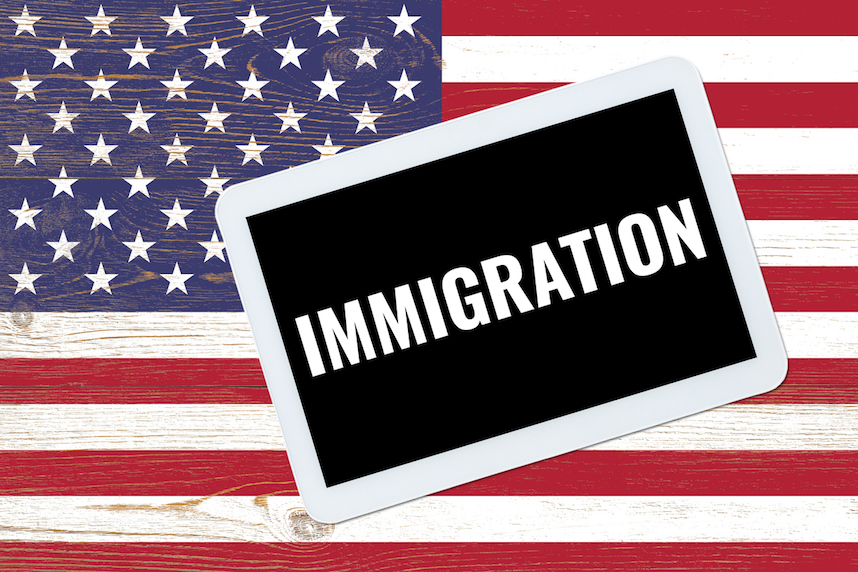The Undocumented Worker Crisis: Trump’s Wall May Not Be Needed

San Diego, CA: A new report about the US undocumented worker supply authored by economists at the University of California San Diego puts a decidedly different spin on the rhetoric coming out of the Trump Administration, and the campaign that led Donald Trump to the White House. Their findings could have an even more lasting impact on the state of California, if their forecasts turn out to be accurate.
The undocumented worker in California has historically been subjected to a bad rap from those outside the state, or those not conversant with the importance the undocumented worker is to the economy of California. To that end, the state economy relies more heavily on the undocumented worker than most other regions – so much so that state government views the undocumented worker as someone who should be embraced and protected, rather than vilified and threatened with deportation on the next wagon train out of town.
Donald Trump campaigned hard on his vision of a looming crisis to the US economy should undocumented workers continue to flow into the country unabated and unchallenged, and upon his election has promised to curb the inflow of undocumented workers and send them packing.
California has long since worried about the effect such a policy would have on the state economy. But even more troubling, say advocates of California’s undocumented workers, are the threats to otherwise hard-working and law-abiding workers who contribute greatly to the culture and economy of the state – in jobs that might prove unsavory to most Californians – and who, with the possible exception of their undocumented status, are doing everything right.
Now comes a report that suggests claims made by the Trump campaign – rhetoric that could potentially become federal policy – could be rooted more in presumption than fact.
Economists Gordon Hanson, Chen Liu and Craig McIntosh noted data generated by the Brookings Institute reflected a steady influx of workers coming into the US from Mexico and other Latin American countries from the 1980s through the early 2000s. The restively high incomes in the US – as compared with what workers might expect to earn back home – made the US an attractive option to find work, raise a family and earn a living.
However – and this is useful information for any undocumented worker lawyer and her client battling the perception of the undocumented worker flooding into the market unabated and taking jobs away from able-bodied Americans – the low-skilled immigrant workforce has shrunk since the Recession of 2008. The immigrant workforce has also aged, and given shrinking growth in the labor supply in Mexico and other Latin American countries, there are fewer workers available to replenish the domestic undocumented labor supply in the US.
“From the rhetoric during and since the 2016 presidential election, one would think that the United States continues to experience a surge of low-skilled immigration. Although in previous decades such labor inflows certainly occurred, since the Great Recession, U.S. borders have become a far less active place when it comes to the net arrival of foreign labor,” according to the report.
The collapse in the US housing market stemming from the 2008 real estate bubble burst translated to fewer construction starts – and fewer construction jobs. What’s more, note the report authors, Latin American countries had lower fertility rates in the 1970s. That translated into fewer people attaining working age, and a corresponding dip in the migration to the US for jobs.
The report’s authors note the slowdown could remain a factor until 2050.
The take away message is that a further decline in undocumented workers in the US will not require any kind of a policy change from the Trump Administration in an effort to lower the numbers – or eradicate them altogether. A wall is not needed. Natural economic forces appear to have taken care of that score, for decades to come.
In the meantime California is hanging onto its supply of undocumented workers for dear life, knowing their importance to the state economy. A state that values the undocumented worker remains an important ally for any undocumented worker facing the prospect of an undocumented worker lawsuit due to unfair treatment on the part of an employer.
‘Along the Watchtower: The Rise and Fall of US Low-Skilled Immigration,’ was published last month by The Brookings Institute.
The undocumented worker in California has historically been subjected to a bad rap from those outside the state, or those not conversant with the importance the undocumented worker is to the economy of California. To that end, the state economy relies more heavily on the undocumented worker than most other regions – so much so that state government views the undocumented worker as someone who should be embraced and protected, rather than vilified and threatened with deportation on the next wagon train out of town.
Donald Trump campaigned hard on his vision of a looming crisis to the US economy should undocumented workers continue to flow into the country unabated and unchallenged, and upon his election has promised to curb the inflow of undocumented workers and send them packing.
California has long since worried about the effect such a policy would have on the state economy. But even more troubling, say advocates of California’s undocumented workers, are the threats to otherwise hard-working and law-abiding workers who contribute greatly to the culture and economy of the state – in jobs that might prove unsavory to most Californians – and who, with the possible exception of their undocumented status, are doing everything right.
Now comes a report that suggests claims made by the Trump campaign – rhetoric that could potentially become federal policy – could be rooted more in presumption than fact.
Economists Gordon Hanson, Chen Liu and Craig McIntosh noted data generated by the Brookings Institute reflected a steady influx of workers coming into the US from Mexico and other Latin American countries from the 1980s through the early 2000s. The restively high incomes in the US – as compared with what workers might expect to earn back home – made the US an attractive option to find work, raise a family and earn a living.
However – and this is useful information for any undocumented worker lawyer and her client battling the perception of the undocumented worker flooding into the market unabated and taking jobs away from able-bodied Americans – the low-skilled immigrant workforce has shrunk since the Recession of 2008. The immigrant workforce has also aged, and given shrinking growth in the labor supply in Mexico and other Latin American countries, there are fewer workers available to replenish the domestic undocumented labor supply in the US.
“From the rhetoric during and since the 2016 presidential election, one would think that the United States continues to experience a surge of low-skilled immigration. Although in previous decades such labor inflows certainly occurred, since the Great Recession, U.S. borders have become a far less active place when it comes to the net arrival of foreign labor,” according to the report.
The collapse in the US housing market stemming from the 2008 real estate bubble burst translated to fewer construction starts – and fewer construction jobs. What’s more, note the report authors, Latin American countries had lower fertility rates in the 1970s. That translated into fewer people attaining working age, and a corresponding dip in the migration to the US for jobs.
The report’s authors note the slowdown could remain a factor until 2050.
The take away message is that a further decline in undocumented workers in the US will not require any kind of a policy change from the Trump Administration in an effort to lower the numbers – or eradicate them altogether. A wall is not needed. Natural economic forces appear to have taken care of that score, for decades to come.
In the meantime California is hanging onto its supply of undocumented workers for dear life, knowing their importance to the state economy. A state that values the undocumented worker remains an important ally for any undocumented worker facing the prospect of an undocumented worker lawsuit due to unfair treatment on the part of an employer.
‘Along the Watchtower: The Rise and Fall of US Low-Skilled Immigration,’ was published last month by The Brookings Institute.











No Comments